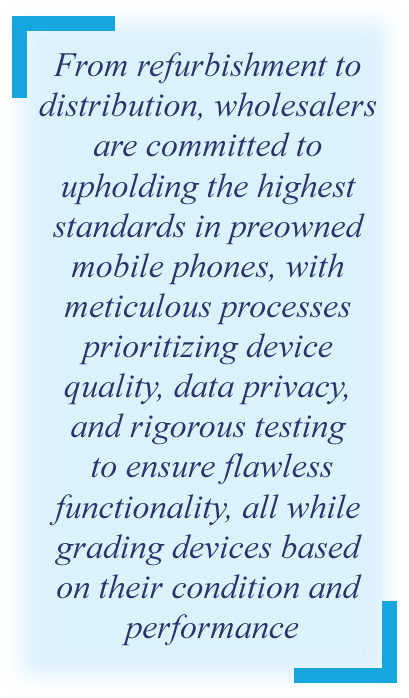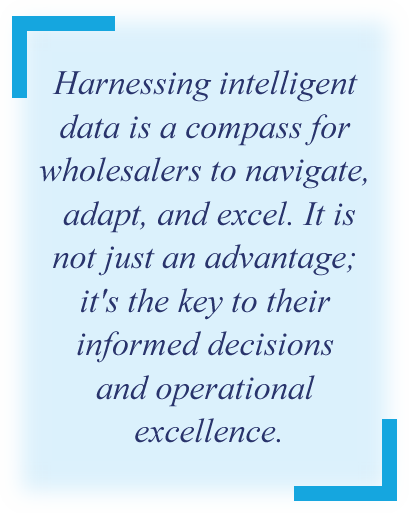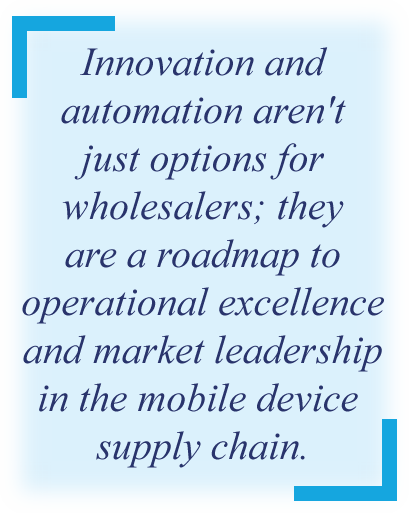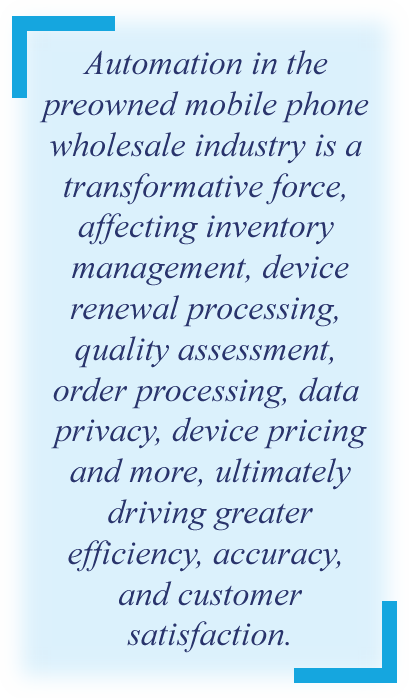The FutureDial Blog (9.28.2023) 
![]() TAKEAWAY: In the complex pre-owned mobile phone market, wholesalers play a vital role in bulk transactions, acquiring used phones through auctions and selling them in large quantities to optimize profits. As experts in extensive device redistribution, wholesalers ensure a steady supply of pre-owned mobile devices to diverse secondary markets by revitalizing used phones, benefiting all parties involved in the trade.
TAKEAWAY: In the complex pre-owned mobile phone market, wholesalers play a vital role in bulk transactions, acquiring used phones through auctions and selling them in large quantities to optimize profits. As experts in extensive device redistribution, wholesalers ensure a steady supply of pre-owned mobile devices to diverse secondary markets by revitalizing used phones, benefiting all parties involved in the trade.
This article is Part 3 of a nine-part series, delving deep into the role and functions of Wholesalers within this intricate Backend Ecosystem.
Behind-the-Scenes Look Inside the Ecosystem of Refurbished Mobile Phones
With the surge in cutting-edge mobile devices, users are swapping old models for newer ones, and this trend propels the growth of the pre-owned mobile phone secondary market. This expanding market drives a competitive industry that refurbishes and resells these devices. Beneath the surface lies a captivating journey — a complex integrated ecosystem where key players oversee processing, refurbishment, and resale of pre-owned mobile phones in global secondary markets. In this pre-owned mobile device market, wholesalers have emerged as the power driving bulk transactions.
In this Part 3, we follow preowned mobile phones as they go through their renewal journey with Wholesalers within this intricate Backend Ecosystem, for later resale in secondary markets.
PART 3: Wholesalers Powering Bulk Transactions in the Mobile Device Ecosystem
Within the expansive and complex realm of pre-owned mobile devices, wholesalers play a pivotal role in facilitating large-scale transactions. Their primary objective revolves around procuring pre-tested, pre-owned mobile phones through auctions and then reselling them in substantial quantities to optimize their profits. While refurbishers dedicate themselves to extensive device improvement, wholesalers may choose a more streamlined approach, prioritizing the swift and efficient movement of devices through the resale pipeline.
![]() Wholesalers kickstart their operations by skillfully bidding in auctions to acquire device lots aligned with their business goals. These auction lots can vary in terms of phone models, conditions, and quantities, necessitating sharp decision-making to curate an inventory primed for profitable resale.
Wholesalers kickstart their operations by skillfully bidding in auctions to acquire device lots aligned with their business goals. These auction lots can vary in terms of phone models, conditions, and quantities, necessitating sharp decision-making to curate an inventory primed for profitable resale.
While not engaging in extensive refurbishment, wholesalers meticulously evaluate device quality and condition. Meeting predefined criteria, like functional integrity and minimal cosmetic flaws, is vital to maintain standards while catering to downstream buyers.
Their core role revolves around swiftly reselling these devices at auction or to other buyers, ensuring a constant cash flow and minimal inventory holding costs. Efficiently moving devices through resale is their key to success, with each transaction aiming to turn a profit or at least break even.
In a competitive and fast-paced market, wholesalers keep a keen eye on market shifts, taking advantage of opportunities for favorable deals and well-timed transactions.
Essentially, wholesalers are the master facilitators of large-scale device redistribution, ensuring a continuous supply of pre-owned mobile devices reaches diverse secondary markets. Their dynamic and agile approach keeps the device ecosystem vibrant. Leveraging their strategic acumen and transactional skills, wholesalers breathe new life into pre-owned devices, benefiting all stakeholders in the mobile phone trade.
Some Characteristics of their Business:
1. How Wholesalers Collect Phones:
In the mobile device reverse logistics supply chain, wholesalers systematically collect preowned phones for bulk resale in secondary markets. This process combines partnerships, quality control, data privacy, and strategic distribution. Note that the specifics can vary among wholesalers, but they employ diverse collection channels to acquire pre-owned phones in bulk:
a. Partnerships with Retailer and Carrier Phone Trade-in Programs
b. Sourcing Phones from Recycling Centers
c. Buying Batches of Like-New Phones from Refurbishment Companies
d. Offering Their Own Trade-In Programs for Cash or Credit towards New Purchases
e. Purchasing Phones from Online Marketplaces and Auction Websites
2. Device Processing Considerations by Wholesalers:
Processing preowned mobile phones for later resale in secondary markets involves several critical considerations for wholesalers. These considerations ensure that the devices are properly assessed, refurbished if necessary, and prepared for resale in a way that meets market demand and customer expectations. Some of these key processing considerations include:

Refurbishment and Repairs: Wholesalers may refurbish devices as needed, replacing components such as batteries, screens, buttons, and cameras, and addressing functional issues. The aim is to restore devices to like-new functionality and appearance.
IMEI and Serial Number Checking: Wholesalers must verify the legitimacy of device IMEI and serial numbers, ensuring they are not blacklisted due to theft or other issues to prevent the resale of stolen devices.
Data Erasure and Refurbishment: Before reselling, wholesalers ensure that all personal data is wiped from the devices to protect user privacy. In the case of refurbishment, any necessary repairs are performed to bring the devices to a sellable condition.
Software Updates: Wholesalers often update the devices' software to the latest version available. This ensures that the devices are running smoothly and are compatible with modern applications.
Testing, Grading and Quality Assessment: After refurbishment and processing, devices undergo meticulous testing and quality control to verify repairs and enhancements, ensuring defect-free functionality. Wholesalers then grade them based on condition, including categories like "new," "like-new," "good," and "fair," determined by overall performance.
Customization: Some wholesalers provide customization services, like installing specific apps or configuring settings to meet market demands, tailoring devices for specific regions or purposes.
Documentation and Certification: Some markets or buyers may require certifications or documentation that certifies the authenticity and quality of the preowned devices. Wholesalers may be obligated to supply warranties, grading certificates, or other relevant documentation.
Repackaging, Branding, and Efficient Bulk Sorting:Wholesalers prioritize repackaging, branding, and efficient bulk sorting. Customized packaging enhances presentation and protection during transit. Devices are carefully grouped based on model and grade, optimizing resale quantities. Streamlined inventory management ensures accurate, quick order fulfillment, maintaining seamless operations and enhancing brand value.
Logistics and Distribution Planning: Wholesalers must strategize efficient distribution to secondary markets, selecting suitable transportation methods and secure packaging to safeguard devices from damage during transit.
Distribution to Secondary Markets: Finally, wholesalers distribute the preowned phones to secondary markets. These markets could include smaller retailers, online marketplaces, overseas markets, or other buyers who are interested in purchasing devices in bulk.
By carefully considering these factors, wholesalers can maximize the value of preowned mobile phones, meet customer expectations, and build a reputation for providing reliable and high-quality devices in secondary markets.
3. Downstream Selling of Devices by Wholesalers:
Wholesalers in the reverse mobile supply chain play a pivotal role in bridging preowned mobile phones with secondary market buyers. Their mission encompasses not only recouping investments and generating revenue but also democratizing access to affordable smartphones. The downstream selling process involves comprehensive steps, starting with astute market research and analysis to identify demand, pricing trends, and target customer segments. Armed with this insight, wholesalers craft a dynamic pricing strategy that accounts for device condition, features, brand, and market value while staying competitive and profitable.
Next, they strategically choose sales channels, which may include online marketplaces, B2B engagements, auctions, and, if necessary, physical stores. Effective marketing efforts, featuring detailed device listings and leveraging social media, email, and advertising, amplify their reach. Online marketplaces like eBay and Amazon serve as crucial platforms for listing, pricing, inventory management, and customer interactions. Wholesalers often opt for bulk sales to smaller retailers to facilitate efficient inventory turnover.
Building buyer confidence, they offer limited warranties on device functionality. Ensuring post-sale order fulfillment, secure packaging, and responsive customer support are part of their commitment to customer satisfaction. To handle any potential discrepancies, they establish clear returns and refunds policies and manage the intricacies of payment processing. Careful inventory management prevents overselling and maintains accurate stock levels.
Wholesalers understand the value of positive feedback and reviews in shaping future sales and are dedicated to providing exceptional service and high-quality devices. They navigate legal complexities by adhering to relevant laws and regulations, ensuring consumer protection and compliance in electronics sales. Lastly, a dedication to continuous improvement drives them to analyze sales performance, customer feedback, and market trends, ensuring adaptability to dynamic market conditions and an ever-enhanced customer experience.
4. How Wholesalers Utilize Intelligent Data in their Operations:
Wholesalers of preowned mobile phones can leverage intelligent data derived from machine learning and data-driven algorithms in various ways to enhance their business operations, make informed decisions, and optimize their processes. Here are some key areas in which wholesalers utilize intelligent data:
1.  Demand Forecasting
Demand Forecasting
2. Price Optimization
3. Inventory Management
4. Quality Grading and Assessment
5. Customer Segmentation
6. Marketing and Sales Analytics
7. Supply Chain Optimization
8. Industry and Consumer Trend Identification
9. Risk Assessment
10. Analysis of Customer Feedback
11. Predictive Maintenance in Device Refurbishment or Repairs
12. Compliance and Regulations
13. Continuous Improvement of Processes and Operations
Wholesalers of preowned mobile phones can benefit significantly from intelligent data utilization. By leveraging data analytics, machine learning, and other intelligent technologies, they can streamline their operations, make well-informed decisions, and adapt to the dynamic nature of the mobile device resale market.
5. Real-World Challenges that Wholesalers Face:
Wholesalers of preowned mobile devices navigate a complex and dynamic supply chain landscape, encountering numerous challenges. These include the need for rigorous quality assessment, robust data privacy measures, and counterfeit/stolen device prevention. They must also adapt swiftly to market volatility, manage pricing pressures, and navigate intricate regulatory landscapes, all while establishing reliable supplier relationships and building and maintaining customer trust. Efficiently handling warranty claims, preventing fraud, and managing logistics for diverse device types and seasonal demand fluctuations are additional hurdles that wholesalers must overcome.
In this multifaceted environment, wholesalers must employ meticulous quality control processes, stringent data privacy measures, and anti-counterfeit measures. They should stay agile in response to market changes, maintain competitive pricing, and ensure regulatory compliance. Establishing trusted supplier relationships and prioritizing customer satisfaction through accurate grading and warranty support are vital. Finally, wholesalers must implement efficient logistics strategies and adapt to seasonal demand fluctuations to thrive in the preowned mobile device industry.
Navigating these challenges requires a combination of strategic planning, automation for operational excellence, adherence to industry best practices, and continuous adaptation to changes in the mobile device industry.
6. How Wholesalers Approach Innovation and Automation for their business operations:
 Wholesalers of preowned mobile phones in the mobile supply chain can leverage innovation and automation to streamline their operations, enhance efficiency, and stay competitive in the market. Key areas for these enhancements include Inventory Management and Tracking, where specialized software and automated reordering systems streamline stock monitoring. Quality Assessment and Grading benefit from automated tools using image recognition and AI algorithms, ensuring precise evaluation of device conditions. Data Wiping and Security measures are strengthened with automated data-clearing tools, adhering to privacy regulations. Market Research and Pricing are made more effective through automated pricing algorithms, considering market demand and competition.
Wholesalers of preowned mobile phones in the mobile supply chain can leverage innovation and automation to streamline their operations, enhance efficiency, and stay competitive in the market. Key areas for these enhancements include Inventory Management and Tracking, where specialized software and automated reordering systems streamline stock monitoring. Quality Assessment and Grading benefit from automated tools using image recognition and AI algorithms, ensuring precise evaluation of device conditions. Data Wiping and Security measures are strengthened with automated data-clearing tools, adhering to privacy regulations. Market Research and Pricing are made more effective through automated pricing algorithms, considering market demand and competition.
Order Processing and Fulfillment are optimized with automated systems for processing, packaging, and shipping, along with order tracking and customer notifications. Some wholesalers employ AI-powered chatbots for Customer Support. Analytics and Reporting tools provide valuable insights, while Marketplace Integration streamlines online sales. Wholesalers can also automate device refurbishment or repairs, and predictive maintenance tasks, minimizing downtime. Leveraging AI for Market Trend Analysis and ensuring Regulatory Compliance through automated checks further enhances their competitive edge.
Wholesalers should assess their specific needs and select suitable technology solutions aligned with their business objectives to achieve operational efficiency and customer satisfaction.
7. Where Wholesalers Experience Wasted Opportunities in their business operations:
Wholesalers of preowned mobile phones reselling into secondary markets can experience wasted opportunities in several operational areas. Identifying and addressing these areas of inefficiency is crucial for maximizing revenue and overall business success. Here are some operational areas where wholesalers might encounter wasted opportunities:

Procurement and Sourcing: Some wholesalers miss out on procurement opportunities by not establishing reliable supplier relationships and thus may miss a consistent supply of quality preowned devices, and over-reliance on a single supplier or channel can also create supply chain vulnerabilities.
Quality Assessment and Grading: Some wholesalers miss opportunities due to inaccurate device grading, which can result in undervaluing or overestimating device conditions, causing customer dissatisfaction. Also, relying solely on manual grading processes can slow operations and delay inventory turnover.
Pricing Strategy: Some mobile device wholesalers miss pricing opportunities by underpricing renewed devices, potentially missing out on revenue in high-demand markets, while overpricing can discourage buyers and slow inventory turnover.
Inventory Management: Some wholesalers miss opportunities by overstocking less-demanded mobile devices, tying up capital and space, while understocking popular mobile devices can lead to missed sales opportunities.
Market Trends and Demands: Some wholesalers miss out by not adjusting their inventory according to evolving market trends and consumer preferences, which could result in holding obsolete mobile device models.
Automation and Efficiency: Some wholesalers miss out on automation and efficiency by relying on manual processes, which can slow operations and lead to errors, and by failing to adopt technology solutions like inventory management software or automated grading tools.
Marketplace Diversification: Some wholesalers miss opportunities in marketplace diversification by limiting their sales channels for preowned mobile devices, thus potentially reducing exposure to potential buyers by relying solely on one platform.
Data Utilization: Some wholesalers miss operational data opportunities by underutilizing analytics, neglecting to analyze sales, customer behavior, processing operations, and market trends, hindering informed decision-making that impacts profitability.
By addressing these areas of wasted opportunities and implementing strategies to optimize operations, wholesalers can improve their overall business performance, increase revenue, and remain competitive in the preowned mobile phone resale market.
8. How Wholesalers can streamline their business operations:
Wholesalers operating in the preowned mobile phone market can enhance their efficiency by adopting strategic measures, technology integration, and optimizing processes. Here are key areas for improved effectiveness:
Firstly, implementing inventory management software streamlines stock tracking, automated reordering, and order processing, enabling efficient fulfillment from order receipt to shipping. Additionally, automated device grading using image recognition and AI algorithms ensures consistent and accurate assessments, enhancing pricing accuracy.
Secondly, adopting a data-driven pricing strategy through market analysis keeps prices aligned with demand, condition, and competition. Staying informed about market trends and technological advancements enables informed inventory decisions.
Lastly, investing in employee training for efficient technology use reduces errors and boosts productivity, freeing up employees for more value-added tasks. In this way, wholesalers can optimize their operations, stay agile in response to market shifts, and thrive in the competitive preowned mobile phone and secondary markets.
9. What Do Wholesalers Consider when Embracing Change for their Business?
Embracing change is essential for preowned mobile phone wholesalers seeking success in competitive markets. To effectively navigate these transformations, wholesalers should begin by establishing clear goals and objectives that align with their long-term vision, ensuring that the changes contribute to sustainable growth and success in evolving market conditions.
Stakeholder engagement plays a crucial role, involving input and support from the team, suppliers, and partners throughout the change process, fostering a continuous feedback loop. Metrics and key performance indicators (KPIs) help measure the impact of changes, while proper resource allocation ensures successful implementation. Embracing technology and investing in training programs enhance operational efficiency, and risk assessment and mitigation strategies are essential for addressing potential challenges.
Flexibility and adaptability should be prioritized, with adjustments based on feedback and customer impact assessment, all while ensuring compliance with industry regulations and legal requirements. By carefully considering these factors, wholesalers can navigate change effectively, minimize disruptions, and ensure that their business evolves in line with their overarching goals and strategies.
10. Are Warehouse Management Systems Obsolete for Wholesalers?
Warehouse Management Systems (WMS) are not necessarily obsolete for wholesalers dealing in preowned mobile phones for secondary markets. However, the effectiveness of a WMS might depend on the specific business model, scale, and operational needs of the wholesaler.
Warehouse Management Systems (WMS) provide wholesalers with a wide array of benefits. They offer advanced tools for precise inventory tracking, particularly valuable when dealing with diverse inventories of preowned mobile phones. WMS also enhance order fulfillment by reducing errors and ensuring timely, accurate shipments, thereby boosting customer satisfaction. Moreover, WMS aids in optimizing warehouse space utilization and streamlines repetitive tasks through automation, reducing manual labor and improving overall efficiency. Some advanced WMS systems even offer demand forecasting and analytics capabilities for inventory planning, while generating detailed reports on key performance metrics, empowering businesses with valuable insights for informed decision-making. Some WMS considerations include:
Complexity: If the wholesaler's operations are relatively small-scale and simple, a full-fledged WMS might be overkill. In such cases, simpler inventory management tools or spreadsheets could suffice.
Adaptability: Wholesalers dealing in rapidly changing markets might find it challenging to keep WMS configurations up to date with new devices, models, and conditions.
Cost: Implementing and maintaining a WMS can be a significant investment in terms of software costs, hardware, training, and ongoing maintenance.
Customization: A standard WMS might need customization to cater specifically to the unique requirements of preowned mobile phones, which could add complexity and cost.
Ease of Use: Some WMS systems can be complex to implement and use, requiring training for employees.
When considering alternatives to Warehouse Management Systems (WMS), wholesalers have several options to explore. Specialized inventory management software can be a viable choice, offering essential features without the complexity associated with a full-fledged WMS. Another approach involves integrating inventory management with other systems such as Customer Relationship Management (CRM), sales platforms, and financial software, creating a unified and efficient workflow. For smaller businesses, manual methods using spreadsheets and basic tracking tools may suffice. Some wholesalers adopt a hybrid approach, combining elements of WMS with simpler tools where necessary.
Ultimately, the decision on which approach to adopt should be driven by the specific needs and goals of the wholesaler, with the primary objective being the optimization of operations, increased efficiency, and alignment with the business's size and complexity.
 How Automation Helps Wholesalers
How Automation Helps Wholesalers
Automation is a game-changer for wholesalers dealing with preowned mobile phones in secondary markets. It revolutionizes inventory management by offering real-time tracking, ensuring precise stock levels, and reducing overstock and stockout risks. Moreover, it enhances quality assessment by eliminating human errors and speeding up the process. Automation also optimizes order processing, leading to faster, error-free fulfillment and improved customer satisfaction. It plays a crucial role in data wiping to protect consumer privacy and helps shape dynamic pricing strategies based on real-time market data. Additionally, it generates insightful reports and analytics for strategic decision-making, saves time and resources, ensures accuracy and consistency, and fosters adaptability to change, all while simplifying regulatory compliance and elevating customer satisfaction.
Automation is the cornerstone of success for wholesalers in the preowned mobile phone market. It optimizes inventory management, quality assessment, order processing, data wiping and other processing tasks for devices, pricing strategies, reporting, and resource utilization, all while ensuring accuracy, consistency, and regulatory compliance.
![]() Profit-Boosting Solutions for Wholesalers in the Mobile Supply Chain Wholesalers and other players in the ecosystem of refurbishing and renewing traded phones partner with FutureDial for mobile device processing automation and data management solutions that enhance their business operations and increase their profitability. Whether you are a wholesaler, refurbisher, reseller, 3PL, MNO or MVNO, trade-in provider, wireless carrier, or another part of the reverse logistics mobile supply chain, FutureDial's technology can elevate your processes, boost efficiency, and ultimately increase profitability and stay ahead in this competitive market. Contact FutureDial at sales@futuredial.com
Profit-Boosting Solutions for Wholesalers in the Mobile Supply Chain Wholesalers and other players in the ecosystem of refurbishing and renewing traded phones partner with FutureDial for mobile device processing automation and data management solutions that enhance their business operations and increase their profitability. Whether you are a wholesaler, refurbisher, reseller, 3PL, MNO or MVNO, trade-in provider, wireless carrier, or another part of the reverse logistics mobile supply chain, FutureDial's technology can elevate your processes, boost efficiency, and ultimately increase profitability and stay ahead in this competitive market. Contact FutureDial at sales@futuredial.com
Coming Up:
Don’t Miss PART 4 of our Backend Ecosystem Review, describing the roles of MNOs and MVNOs in the Preowned Mobile Device Market.
© 2023 FutureDial Incorporated. All Rights Reserved.

